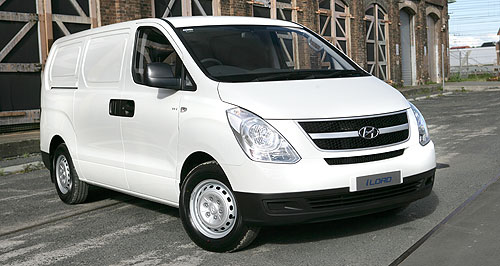News - General NewsRe-think on compulsory ESC for LCVsIn the van: Mercedes-Benz is one manufacturer to already offer ESC on commercial vehicles, such as the Vito van. Albanese reviews decision not to include utes, vans in new ESC laws20 Jul 2009 By TERRY MARTIN FEDERAL transport minister Anthony Albanese is reviewing the case for making electronic stability control (ESC) mandatory on commercial vehicles after calls for the federal government to broaden forthcoming legislation for passenger cars and SUVs to include workhorses such as utilities and vans. As GoAuto reported last week, the Society of Automotive Engineers – Australasia (SAE-A) became the latest motoring organisation to urge Mr Albanese to include commercial vehicles in new regulations requiring ESC to be fitted to all new passenger cars and SUVs sold from November 2011. The NRMA and other road safety campaigners have also called for commercial vehicles to be included in the new laws, which will be extended in November 2013 to include all passenger/SUV models on the market. In response, a spokesperson for the transport minister has told GoAuto: “The minister has asked his department to review the case for mandating ESC in commercial vehicles up to and including 3.5 tonnes. Over coming months, industry and other stakeholders will be consulted as part of this process.” According to the government, the Australian regulations will phase-in ESC a year ahead of Europe. It said the case for mandating ESC – which has the potential to reduce a motorist’s chance of being involved in a fatal accident by 25 per cent – was established through public consultations that accompanied the release in November last year of a ‘regulatory impact statement for the control of vehicle stability’. The consultative process involved government, industry, employee and consumer representatives. It followed Australia’s vote at the United Nations in June 2008, along with other members of the ‘World Forum for Harmonisation of Vehicle Standards’, to adopt a new UN global technical regulation on ESC. “We are adopting a United Nations set standard, which was set for these (types of) vehicles,” Mr Albanese’s spokesperson said. “The timetable that we are adopting is similar to the United States, and is similar to Europe except in one example where Europe has deviated by delaying its introduction by 12 months in terms of existing models of cars. “What we have said regarding utes and light commercials is that the department will do some more work in terms of investigating the options around them. “But we’ve got to maintain our consistency with what is happening internationally on these issues.” The spokesperson said the government was taking a consistent approach with other regions – particularly Europe, the US and Japan – because the vast majority of new vehicles sold in Australia are imported.  Read more13th of July 2009  Engineers urge mandatory ESC on commercial vehiclesSAE calls on government to include commercials in mandatory ESC laws23rd of June 2009  Canberra makes ESC mandatoryIndustry welcomes legislation requiring all new cars to be fitted with ESC by 2013 |
Click to shareGeneral News articlesResearch General News Motor industry news |
















Facebook Twitter Instagram